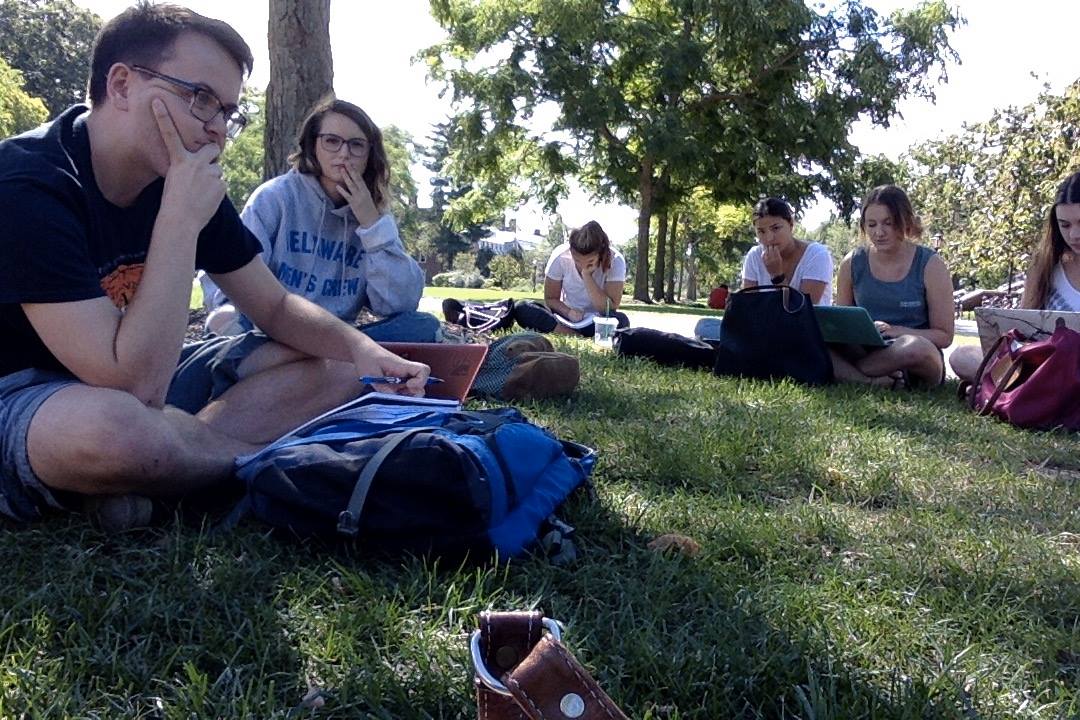“Beginning reporting with Professor Fallik is like pledging a fraternity. It’s a semester of hell, but then you’re set for life.”
– Student evaluation, University of Delaware

My journalism classes at the University of Delaware mix real-world practice with creative exercises. Students must write on deadline, in AP style and to word length – just like any newsroom. They cover meetings, pitch features and decipher press releases to find the news.
I also want them to think about stories and sources beyond the basic writing and editing process. They interview the families of murder victims to hear about what it’s like on the other side of the pen. Medical writers dissect cadavers to understand the complexity of the body. They visit a garden in winter and sit outside blindfolded so they can write a campus scene without the visuals.
In advanced classes, students take video and produce podcasts to accompany their written stories. Most recently, I developed a writing class for doctoral quantum physics students, in which they interviewed and wrote about other scientists and explained their research to undergrad students (who graded them on clarity and accessibility.)
Journalism Internship Director Materials
Teaching:
I’ve taught JOUR301 – the intro news literacy course, ENGL307, beginning skills, ENGL308 intermediate skills, Medical Writing (ENGL409) and Critical Writing (ENGL409) many times.
Each link should include the syllabus, course schedule and examples of student work. The documents will download and the online, video and multimedia links should go right to the site.
I obtained press credentials for three students to attend the 2016 Democratic National Convention in Philadelphia, and I’ve included a separate section for those stories.
Student Success: My students now cover NASA for The Atlantic, science for VOX, basketball for Sports Illustrated, international news for ABC, community issues for The News Journal and are editors for the York Dispatch, Business Insider and Real Simple magazine.
Class Materials:
- Journalism in a Free World (JOUR301: News Literacy)
- Beginning Journalism Skills (ENGL307)
- Intermediate Journalism Skills (ENGL308)
- Medical Writing (ENGL409:Topics in Journalism)
- Critical Writing (ENGL409:Topics in Journalism)
- Social Media (ENGL367)
- DNC Coverage
- How UD journalism alumni covered the pandemic (UD magazine story)
Grant Work:
National Science Foundation grant: August 2021-present. Funded: $999,984. “Characterizing the Global Illicit Trade In Energy-Critical Materials using Machine Learning, Remote Sensing and Qualitative Research.” Five-year grant. PI: Julie Klinger, Dept. of Geography, Co-PI: Dawn Fallik, English Department.
National Institute of Healthcare Management, January 2020. Funded $10,000 Dawn Fallik: 10,000 Followers and No Friends: Collaboration with National Public Radio to produce online and on-air stories focusing on the physical and mental ramifications of social isolation.

“Words For Nerds” is a program I developed with Dr. Joshua Zide, a materials science and engineering professor at UD. The six-week seminar, started in 2019, is funded by a UD “Challenge” grant. Aimed at graduate students, particularly those in STEM fields, about 100 students apply for the 25 slots. They attend weekly seminars with experts in social media, multimedia and mainstream media, with the goal of translating their work to the general public. At the end, students present to a panel of judges, including Associated Press Investigations Editor Ron Nixon, American Association for the Advancement of Science STEM Program Director Dr. Iris Wagstaff and Science News reporter Dr. Tina Hesman-Saey.
Publications:
Please refer to the journalism section of this site for examples of my published work.

